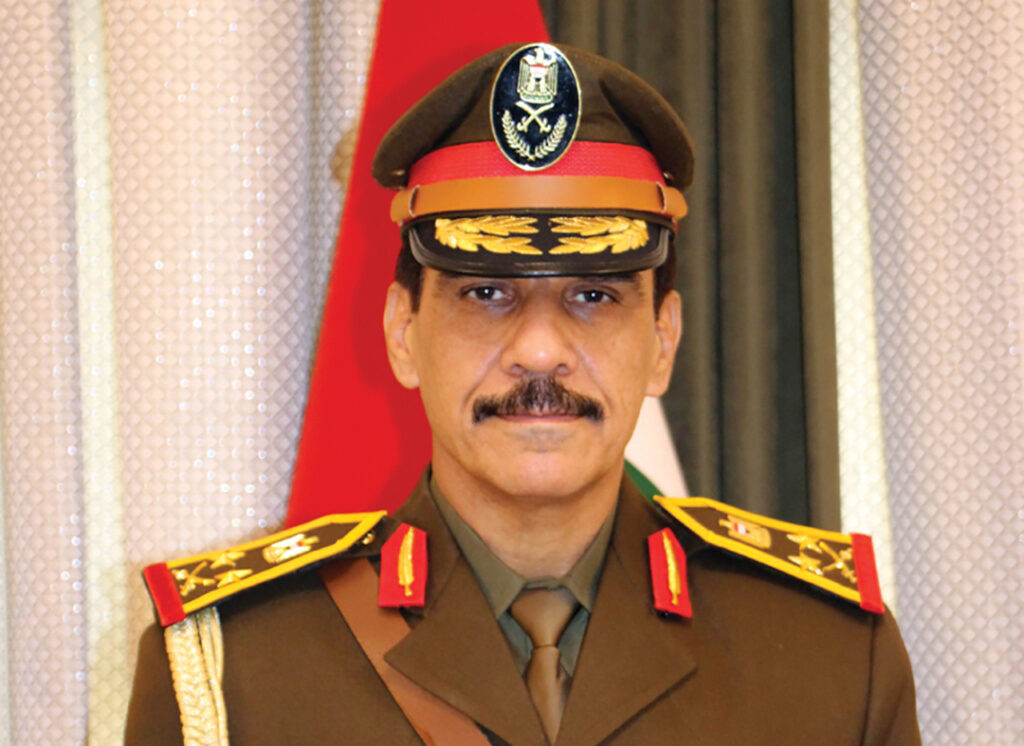UNIPATH STAFF
His striking calmness during the heat of battle reveals leadership skills and self-confidence prized among field commanders. His humility and ethics have made him a highly respected figure among Soldiers and commanders. He frequently visits the front lines and personally follows up the requests of Soldiers. He is Staff Gen. Abdul Amir Rasheed Yarallah, Iraqi Army chief of staff.
During the liberation battles against Daesh terrorist gangs, Army commanders encountered difficult times. But Gen. Yarallah exhibited nerves of steel and military acumen in managing battles. As he walked around the command-and-control center at the Joint Operations Command, his smile would boost Soldiers’ morale and reassure field commanders. His work responsibilities extended late into the night as he supervised battles via video transmitted by reconnaissance aircraft. Instant communication with commanders on the ground ensured the arrival of reinforcements and supplies, some provided by coalition partners. Civilian safety during liberation operations was always a top priority for the general.
“I had the honor of being appointed by the leadership to hold the position of deputy commander of the Combined Joint Forces at an extremely difficult time in Iraq’s history, when Daesh terrorist gangs invaded Mosul, Salahudin and Anbar and besieged Baghdad,” Gen. Yarallah told Unipath. “We worked around the clock to set up a chain of command and make plans for the liberation of these towns. We worked side by side with our coalition partners, encountering extremely tough circumstances and facing huge challenges, but with God’s grace and the courage of our Soldiers, we were able to achieve victory and save civilian lives.”
Promoted to chief of staff, his military philosophy is to build a model army and instill confidence and military pride in the troops through training and proper selection of commanders with leadership qualities their subordinates can emulate.
“A commander’s authority does not derive from the size of his security convoy nor from putting up barriers to keep Soldiers from reaching him; rather a commander’s authority is earned by gaining the trust of his Soldiers,” the general said.
“An officer can’t rule by fear. It’s better to earn a Soldier’s respect. In difficult circumstances, fear of punishment disappears and all that remains is a Soldier’s respect and loyalty.”
He recalls the sorry fates of field commanders who lost crucial battles because they failed to provide for their troops. An officer’s success and the position he occupies depend on his Soldiers’ performance, sacrifices and resilience in battle, the general said.
That means officers must familiarize themselves with the men in their units, including living conditions, accommodations, pay and leave. Officers must apply an open-door policy for all Soldiers and address problems promptly.
“I advise you to take care of your Soldier because he is the key to your success. He is the one who will let you down or support you. He is the hand that carries the rifle and defends the homeland.”
Gen. Yarallah’s dream of being a Soldier came true when he graduated from military college in 1984 (class 86) and earned a place within the 66th Brigade of Iraqi Special Operations Forces. Those troops won acclaim by liberating Um Al-Rasas Island south of Basrah.
He became the commander of a commando regiment in 2001, brigade commander in 2006 and division commander in 2009. His rise continued with promotions to chief of staff of land forces in 2012, assistant Army chief of staff in 2014, deputy commander of the Combined Joint Forces after the fall of Mosul in 2014, and Army chief of staff in 2020.
Gen. Yarallah vouches for the importance of intelligence in fighting terrorism and the recruitment of intelligence officers based on professionalism and competence. They play two main roles: identifying the enemy through contact with the population and fighting corruption within the military itself.
Within the organizational structure of the Iraqi Army, intelligence plays a larger role at the battalion and headquarters levels. But it’s essential that intelligence officers focus on the “ground,” meaning possessing complete knowledge of areas of operations, the general said. They must learn every detail of the enemy and build relationships with citizens to be the eyes and ears of neighborhoods.
In Gen. Yarallah’s view, intelligence operations should include combating organized crime. Such crime often finances terrorism. And when governments appear complacent about organized crime, citizens lose faith in security forces.
“This is one of the fronts of terrorism and must be fought with resolve,” Gen. Yarallah said. “The presence of security forces gives citizens a sense of safety, so we all need to reinforce trust between the citizen and Soldier, because if we do not perform our duty as a security force through preemptive operations to deter terrorism, we will lose our citizens’ confidence in our security forces.”
To fight corruption within military units, intelligence officers need to set the best example for Soldiers in terms of integrity, professionalism and ethics, Gen. Yarallah said. They must strive to fight corruption within operational command and its downrange units. He views the office of director of military intelligence as the principal front in the fight against corruption.
“When it comes to an officer, integrity is paramount. The integrity of an officer within the unit and area of responsibility reflects his upbringing and his military honor,” the general said.
“A commander must be a source of pride for his Soldiers and his nation. We must leave behind a record that is honorable for us and for our families; we must work to build a secure homeland for future generations, so that our children and grandchildren can look back on what we created with pride.”

